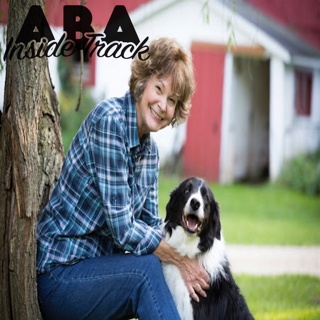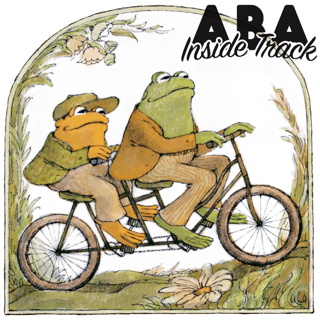
September 2021 Preview
Huzzah! It's the 5th annual Supervision September!! Enjoy all the episodes about supervision that you'll need for the year including our definitive podcast about the classic business/supervision book "How to Win Friends and Influence People" with book club superstar, Alan Haberman. And if that weren't enough, Dr. Manny Rodriguez joins us to talk about promoting ethics in the ABA workplace for a beautiful ethics/OBM sandwich. We're in the process of planning the new year of ABA Inside Track. If you've got some time, we'd appreciate it if you shared you thoughts on a short survey. Thank you! Articles for September 2021 How to Win Friends and Influence People Book Club Carnegie, D. (1936). How to win friends & influence people: The only book you need to lead you to success (1981 edition). New York, New York: Gallery Books. McHugh, J. (2021). How to win friends and influence people (1936). In Americanon: An unexpected U.S. history in thirteen bestselling books (pp. 218-251). New York, New York: Dutton. Fong, E.H., Capell, S., Adedipe, H. An open discussion about race and diversity in behavior analysis [Webinar]. Behavioral Health Center of Excellence. https://bhcoe.org/project/an-open-discussion-about-race-diversity-in-behavior-analysis/ The Ethics of Supervision Sellers, T.P. Alai-Rosales, S., & MacDonald, R.P.F. (2016). Taking full responsibility: The ethics of supervision in behavior analytic practice. Behavior Analysis in Practice, 9, 299-308. doi: 10.1007/s40617-016-0144-x LeBlanc, L.A., Onofrio, O.M., Valentino, A.L., & Sleeper, J.D. (2020). Promoting ethical discussions and decision making in a human service agency. Behavior Analysis in Practice, 13, 905-913. doi: 10.1007/s40617-020-00454-7 Hajiaghamohseni, Z., Drasgow, E., & Wolfe, K. (2021). Supervision behaviors of board certified behavior analysts with trainees. Behavior Analysis in Practice, 14, 97-109. doi: 10.1007/s40617-020-00492-1 Turner, L.B., Fischer, A.J., & Luiselli, J.K. (2016). Towards a competency-based, ethical, and socially valid approach to the supervision of applied behavior analytic trainees. Behavior Analysis in Practice, 9, 287-298. doi: 10.1007/s40617-016-0121-4 Ethics in the ABA Workplace w/ Dr. Manuel Rodriguez Diener, L.H., McGee, H.M., & Miguel, C.F. (2009). An integrated approach for conducting a behavioral systems analysis. Journal of Organizational Behavior Management, 29, 108-135. doi: 10.1080/01608060902874534 Rodriguez, M. (2020). Identifying effective systems and processes to promote ethical workplace cultures in the applied behavior analysis (ABA) therapy industry [Doctoral dissertation, University of South Florida]. Scholar Commons. https://digitalcommons.usf.edu/etd/8483/
1 Syys 202121min

Episode 176 - Sustainability w/ Dr. Meghan Martineau
Though more than ever humanity is waking up to the need to improve our sustainability efforts, doesn't it still feel like looming environmental crises keep getting worse? This week, Dr. Meghan Martineau joins us to discuss the barriers and treatment options to improving human behavior around practices of sustainability. I mean, if an elementary school student can increase neighborhood recycling, shouldn't we behavior analysts be able to effect meaningful change too? This episode is available for 1.0 LEARNING CEU. Articles discussed this episode: Schneider, S.M. & Sanguinetti, A. (2021). Positive reinforcement is just the beginning: Associative learning principles for energy efficiency and climate sustainability. Energy Research & Social Science, 74. doi: 10.1016/jrss.2021/101958 Keller, J.J. (1991). The recycling solution: How I increased recycling on Dilworth Road. Journal of Applied Behavior Analysis, 24, 617-619. doi: 10.1901/jaba.1991.24-617 If you're interested in ordering CEs for listening to this episode, click here to go to the store page. You'll need to enter your name, BCBA #, and the two episode secret code words to complete the purchase. Email us at abainsidetrack@gmail.com for further assistance.
25 Elo 20211h 17min

Bonus Episode 25 - A Chat w/ Dr. Patricia McConnell
After recording our latest patron book club on the dog behavior book, "The Other End of the Leash", we were ecstatic to have the opportunity to learn even more about applied animal behavior from the author herself, Dr. Patricia McConnell. We discussed how "The Other End of the Leash" isn't a typical dog training book, how human behavior is intertwined with animal behavior, and what Dr. McConnell would add in a second edition. McConnell, P.B. (2002). The other end of the leash: Why we do what we do around dogs. Ballantine Books.
19 Elo 202135min

Bonus Episode 24 - The Inaugural BABA Conference w/ Adrienne Bradley + Dr. Danyelle Beal
We were so excited to be a part of the inaugural BABA conference this June as sponsors and attendees. But we still wanted to learn more once the talks wound down. Fortunately, we were able to catch Adrienne Bradley and Dr. Danyelle Beal on a break from preparing next year's conference to hear about the successes and the last minute stressors of pandemic conference planning. Plus, what makes Detroit the perfect site to visit (hopefully in person!) for the 2nd Annual BABA conference.
18 Elo 20211h 19min

Episode 175 - Token Economies in Action
While token economies may be one of the earliest well-known examples of applied behavior analysis in practice, this may have led to two larger issues: overreliance and misunderstanding. This week, we review some older articles leveraging token economy technology in applied areas both old (classroom behavior!) and new (mining!) to see whether everything is as rose-colored as we might have remembered it. This episode is available for 1.0 LEARNING CEU. Articles discussed this episode: McLaughlin, T.F. & Malaby, J. (1972). Intrinsic reinforcement in a classroom token economy. Journal of Applied Behavior Analysis, 5, 263-270. doi: 10.1901/jaba.1972.5-263 Bassett, J.E. & Blanchard, E.B. (1977). The effect of the absence of close supervision on the use of response cost in a prison token economy. Journal of Applied Behavior Analysis, 10, 375-379. doi: 10.1901/jaba.1977.10-375 Fox, D.K., Hopkins, B.L., & Anger, W.K. (1987). The long-term effects of a token economy on safety performance in open-pit mining. Journal of Applied Behavior Analysis, 20, 215-224. doi: 10.1901/jaba.1987.20-215 Zlomke, K. & Zlomke, L. (2003). Token economy plus self-monitoring to reduce disruptive classroom behaviors. The Behavior Analyst Today, 4, 177-182. doi: 10.1037/h0100117 If you're interested in ordering CEs for listening to this episode, click here to go to the store page. You'll need to enter your name, BCBA #, and the two episode secret code words to complete the purchase. Email us at abainsidetrack@gmail.com for further assistance.
11 Elo 20211h 28min

August 2021 Preview
As summer winds down, we're still brining the heat with some hot research topics to discuss. First up, what's the deal with token economies? Is one of our oldest applied technologies still all it's cracked up to be? Then Dr. Meg Martineau has some thoughts on sustainability research for those of us who'd prefer some of our surface areas don't become beachfront property in the next 50 years. And, while we take a much needed vacation, enjoy some bonus episodes discussing the awesome, inaugural Black Applied Behavior Analysis conference and an interview with applied animal behaviorist Dr. Patricia McConnell (featured on our recent book club cast). Articles for August 2021 Token Economies McLaughlin, T.F. & Malaby, J. (1972). Intrinsic reinforcement in a classroom token economy. Journal of Applied Behavior Analysis, 5, 263-270. doi: 10.1901/jaba.1972.5-263 Bassett, J.E. & Blanchard, E.B. (1977). The effect of the absence of close supervision on the use of response cost in a prison token economy. Journal of Applied Behavior Analysis, 10, 375-379. doi: 10.1901/jaba.1977.10-375 Fox, D.K., Hopkins, B.L., & Anger, W.K. (1987). The long-term effects of a token economy on safety performance in open-pit mining. Journal of Applied Behavior Analysis, 20, 215-224. doi: 10.1901/jaba.1987.20-215 Zlomke, K. & Zlomke, L. (2003). Token economy plus self-monitoring to reduce disruptive classroom behaviors. The Behavior Analyst Today, 4, 177-182. doi: 10.1037/h0100117 Sustainability w. Dr. Meghan Martineau Schneider, S.M. & Sanguinetti, A. (2021). Positive reinforcement is just the beginning: Associative learning principles for energy efficiency and climate sustainability. Energy Research & Social Science, 74. doi: 10.1016/jrss.2021/101958 Keller, J.J. (1991). The recycling solution: How I increased recycling on Dilworth Road. Journal of Applied Behavior Analysis, 24, 617-619. doi: 10.1901/jaba.1991.24-617 "The Other End of the Leash Book Club (in case you missed it) McConnell, P.B. (2002). The other end of the leash: Why we do what we do around dogs. Ballantine Books.
4 Elo 202119min

The Other End of the Leash Book Club (PREVIEW)
As voted on by our patrons, we read and discussed Dr. Patricia McConnell's "The Other End of the Leash". Jackie was thrilled to suggest that our summer book club choice feature one of her favorite writers/speakers about dog behavior. But, this book wasn't just another training manual: It delved a lot deeper into both dog and human patterns of behavior. We learned that humans love to talk, dogs don't love being patted on the head, and just why these two Peter Pan species get along so darn well. Even though you may not currently be one of our premium $10 patrons, enjoy this preview of our full length discussion, including our thoughts on dogs, general chat about the book, and a detailed breakdown of the first chapters. Want to hear the rest of the episode and earn 2 CEs.? We invite you to join us on Patreon to hear the rest of this and our other full-length book clubs (plus early access to shows and some other goodies). And, if you enjoy the discussion (or just enjoy dogs), tune back in in August for our interview with Dr. Patricia McConnell! References for this episode: McConnell, P.B. (2002). The other end of the leash: Why we do what we do around dogs. Ballantine Books.
2 Elo 202145min

Episode 174 - Police Brutality and Client Mistreatment w/ Dr. Cody Morris
While many of us might think that the variables maintaining police brutality have nothing to do with us, Dr. Cody Morris may disagree. In fact, in his recent article, he and his co-author, Dr. Nicole Hollins, posit that many of those variables may be responsible for direct-care staff engaging in client mistreatment. Join us as we talk red flags and responses to protect our most at-risk clients. This episode is available for 1.0 LEARNING CEU. Articles discussed this episode: Morris, C. & Hollins, N.A. (2021). On the uncanny similarities between police brutality and client mistreatment. Behavior Analysis in Practice. doi: 10.1007/s40617-021-00576-6 If you're interested in ordering CEs for listening to this episode, click here to go to the store page. You'll need to enter your name, BCBA #, and the two episode secret code words to complete the purchase. Email us at abainsidetrack@gmail.com for further assistance.
28 Heinä 20211h 32min






















